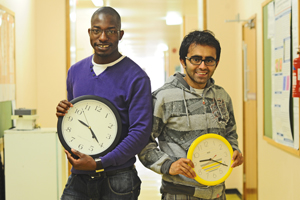Biological alarm clocks that affect performance and immunity
09 December 2011 In time: Lovemore Kunorozva and Vaibhav Bhardwaj worked on different topics, but with time as the common denominator.
In time: Lovemore Kunorozva and Vaibhav Bhardwaj worked on different topics, but with time as the common denominator.
Circadian clocks: That's what the research of two UCT students who've each completed an MSc in molecular and cell biology have in common.
Vaibhav Bhardwaj, whose MSc focuses on plants, and Lovemore Kunorozva, who studied athletes, both had circadian clocks as a theme in their work.
The term 'circadian' refers to events that occur on a 24-hour cycle. All organisms possess circadian rhythms, driven by an internal time-keeping system, or biological clock. This is synchronised by changes in the external environment, particularly the light-dark cycle.
Circadian clocks affect almost every level of human bodily function.
In his dissertation, Diurnal preference and sports performance: A genetic and subjective view, Kunorozva showed that individual athletes such as cyclists, runners and triathletes tend to be morning-type people, or 'larks'.
He showed that these individuals are genetically different, at a circadian clock-associated PER3 gene level, to a healthy, active, non-competitive population.
"Circadian rhythms play a fundamental role in sports in terms of optimising training time, performance, adjustment to global time zone changes and scheduling times of events. Performance varies with time-of-day, and this variation is due in part to circadian regulation of physiology. It generally peaks later in the day, when core body temperature is at its peak."
Kunorozva is planning to do a PhD on the impact of circadian rhythms on sports performance through a study of travelling sports teams.
In his dissertation, Keeping time on the plant-pathogen arms race: A role for the plant circadian clock in immune response, Bhardwaj found there is variation in the response of plants to pathogens depending on the time of infection.
He showed that the circadian clock in plants regulates their immune responses.
"Our central question was, do plant defence responses to bacterial infection vary with time-of-day, and is that a feature of the plant circadian clock?"
All living organisms possess a circadian clock, but for plants this feature is particularly important as they are immobile and cannot flee from adverse conditions.
"So the circadian clock of plants enables them to anticipate regular events such as sunrise and sunset. We investigated whether plants anticipate infection, using their circadian clocks."
Results showed that plant defence responses did indeed show a time-of-day difference, with stronger defence responses initiated at dawn, and weaker defence responses at night.
 This work is licensed under a Creative Commons Attribution-NoDerivatives 4.0 International License.
This work is licensed under a Creative Commons Attribution-NoDerivatives 4.0 International License.
Please view the republishing articles page for more information.







